Literature Review: Understanding Social Worker Attrition and Retention
VerifiedAdded on 2022/08/08
|5
|950
|42
Literature Review
AI Summary
This literature review examines the critical issue of social worker attrition, a problem impacting the quality of services and the well-being of staff. The review explores key factors influencing retention, including work engagement, job satisfaction, and work-life balance, highlighting the pressures social workers face such as heavy caseloads and paperwork. It then delves into motivational strategies, particularly Maslow's hierarchy of needs, and emphasizes the significance of social relationships and peer interactions as key motivators for social workers. The research underscores the need for interventions that address job demands, enhance job satisfaction, and foster supportive work environments to improve retention rates and attract talent to the field.
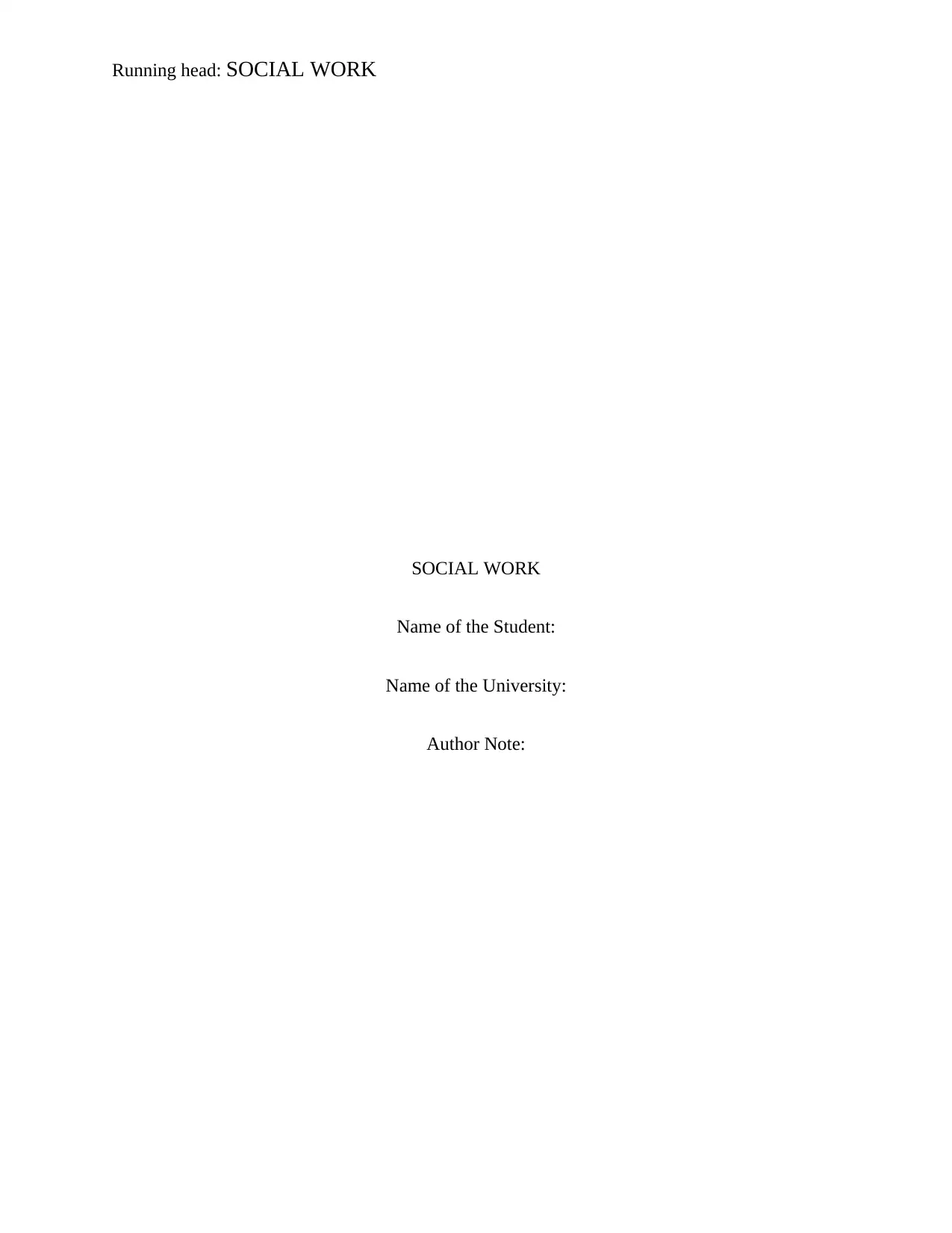
Running head: SOCIAL WORK
SOCIAL WORK
Name of the Student:
Name of the University:
Author Note:
SOCIAL WORK
Name of the Student:
Name of the University:
Author Note:
Paraphrase This Document
Need a fresh take? Get an instant paraphrase of this document with our AI Paraphraser
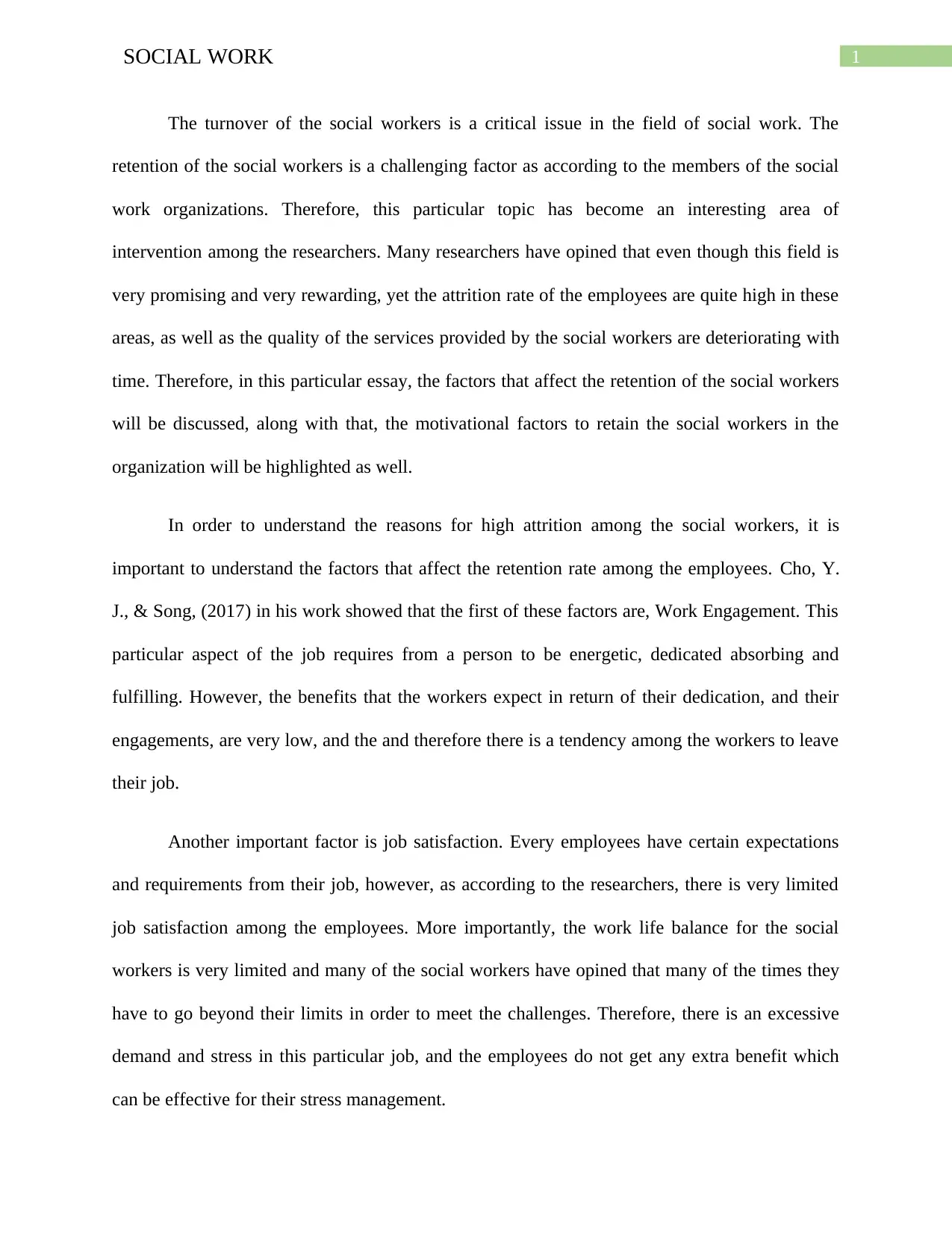
1SOCIAL WORK
The turnover of the social workers is a critical issue in the field of social work. The
retention of the social workers is a challenging factor as according to the members of the social
work organizations. Therefore, this particular topic has become an interesting area of
intervention among the researchers. Many researchers have opined that even though this field is
very promising and very rewarding, yet the attrition rate of the employees are quite high in these
areas, as well as the quality of the services provided by the social workers are deteriorating with
time. Therefore, in this particular essay, the factors that affect the retention of the social workers
will be discussed, along with that, the motivational factors to retain the social workers in the
organization will be highlighted as well.
In order to understand the reasons for high attrition among the social workers, it is
important to understand the factors that affect the retention rate among the employees. Cho, Y.
J., & Song, (2017) in his work showed that the first of these factors are, Work Engagement. This
particular aspect of the job requires from a person to be energetic, dedicated absorbing and
fulfilling. However, the benefits that the workers expect in return of their dedication, and their
engagements, are very low, and the and therefore there is a tendency among the workers to leave
their job.
Another important factor is job satisfaction. Every employees have certain expectations
and requirements from their job, however, as according to the researchers, there is very limited
job satisfaction among the employees. More importantly, the work life balance for the social
workers is very limited and many of the social workers have opined that many of the times they
have to go beyond their limits in order to meet the challenges. Therefore, there is an excessive
demand and stress in this particular job, and the employees do not get any extra benefit which
can be effective for their stress management.
The turnover of the social workers is a critical issue in the field of social work. The
retention of the social workers is a challenging factor as according to the members of the social
work organizations. Therefore, this particular topic has become an interesting area of
intervention among the researchers. Many researchers have opined that even though this field is
very promising and very rewarding, yet the attrition rate of the employees are quite high in these
areas, as well as the quality of the services provided by the social workers are deteriorating with
time. Therefore, in this particular essay, the factors that affect the retention of the social workers
will be discussed, along with that, the motivational factors to retain the social workers in the
organization will be highlighted as well.
In order to understand the reasons for high attrition among the social workers, it is
important to understand the factors that affect the retention rate among the employees. Cho, Y.
J., & Song, (2017) in his work showed that the first of these factors are, Work Engagement. This
particular aspect of the job requires from a person to be energetic, dedicated absorbing and
fulfilling. However, the benefits that the workers expect in return of their dedication, and their
engagements, are very low, and the and therefore there is a tendency among the workers to leave
their job.
Another important factor is job satisfaction. Every employees have certain expectations
and requirements from their job, however, as according to the researchers, there is very limited
job satisfaction among the employees. More importantly, the work life balance for the social
workers is very limited and many of the social workers have opined that many of the times they
have to go beyond their limits in order to meet the challenges. Therefore, there is an excessive
demand and stress in this particular job, and the employees do not get any extra benefit which
can be effective for their stress management.
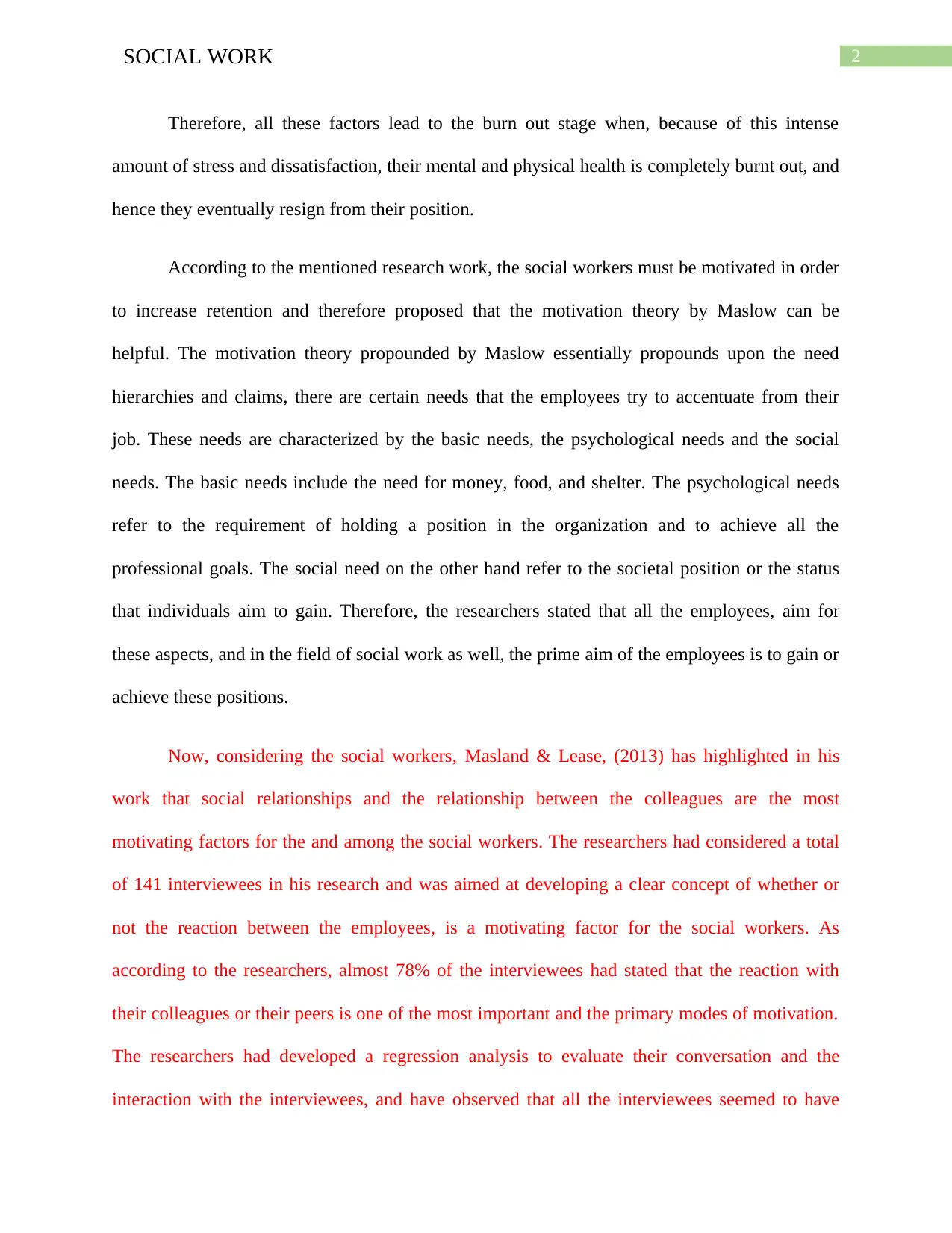
2SOCIAL WORK
Therefore, all these factors lead to the burn out stage when, because of this intense
amount of stress and dissatisfaction, their mental and physical health is completely burnt out, and
hence they eventually resign from their position.
According to the mentioned research work, the social workers must be motivated in order
to increase retention and therefore proposed that the motivation theory by Maslow can be
helpful. The motivation theory propounded by Maslow essentially propounds upon the need
hierarchies and claims, there are certain needs that the employees try to accentuate from their
job. These needs are characterized by the basic needs, the psychological needs and the social
needs. The basic needs include the need for money, food, and shelter. The psychological needs
refer to the requirement of holding a position in the organization and to achieve all the
professional goals. The social need on the other hand refer to the societal position or the status
that individuals aim to gain. Therefore, the researchers stated that all the employees, aim for
these aspects, and in the field of social work as well, the prime aim of the employees is to gain or
achieve these positions.
Now, considering the social workers, Masland & Lease, (2013) has highlighted in his
work that social relationships and the relationship between the colleagues are the most
motivating factors for the and among the social workers. The researchers had considered a total
of 141 interviewees in his research and was aimed at developing a clear concept of whether or
not the reaction between the employees, is a motivating factor for the social workers. As
according to the researchers, almost 78% of the interviewees had stated that the reaction with
their colleagues or their peers is one of the most important and the primary modes of motivation.
The researchers had developed a regression analysis to evaluate their conversation and the
interaction with the interviewees, and have observed that all the interviewees seemed to have
Therefore, all these factors lead to the burn out stage when, because of this intense
amount of stress and dissatisfaction, their mental and physical health is completely burnt out, and
hence they eventually resign from their position.
According to the mentioned research work, the social workers must be motivated in order
to increase retention and therefore proposed that the motivation theory by Maslow can be
helpful. The motivation theory propounded by Maslow essentially propounds upon the need
hierarchies and claims, there are certain needs that the employees try to accentuate from their
job. These needs are characterized by the basic needs, the psychological needs and the social
needs. The basic needs include the need for money, food, and shelter. The psychological needs
refer to the requirement of holding a position in the organization and to achieve all the
professional goals. The social need on the other hand refer to the societal position or the status
that individuals aim to gain. Therefore, the researchers stated that all the employees, aim for
these aspects, and in the field of social work as well, the prime aim of the employees is to gain or
achieve these positions.
Now, considering the social workers, Masland & Lease, (2013) has highlighted in his
work that social relationships and the relationship between the colleagues are the most
motivating factors for the and among the social workers. The researchers had considered a total
of 141 interviewees in his research and was aimed at developing a clear concept of whether or
not the reaction between the employees, is a motivating factor for the social workers. As
according to the researchers, almost 78% of the interviewees had stated that the reaction with
their colleagues or their peers is one of the most important and the primary modes of motivation.
The researchers had developed a regression analysis to evaluate their conversation and the
interaction with the interviewees, and have observed that all the interviewees seemed to have
⊘ This is a preview!⊘
Do you want full access?
Subscribe today to unlock all pages.

Trusted by 1+ million students worldwide
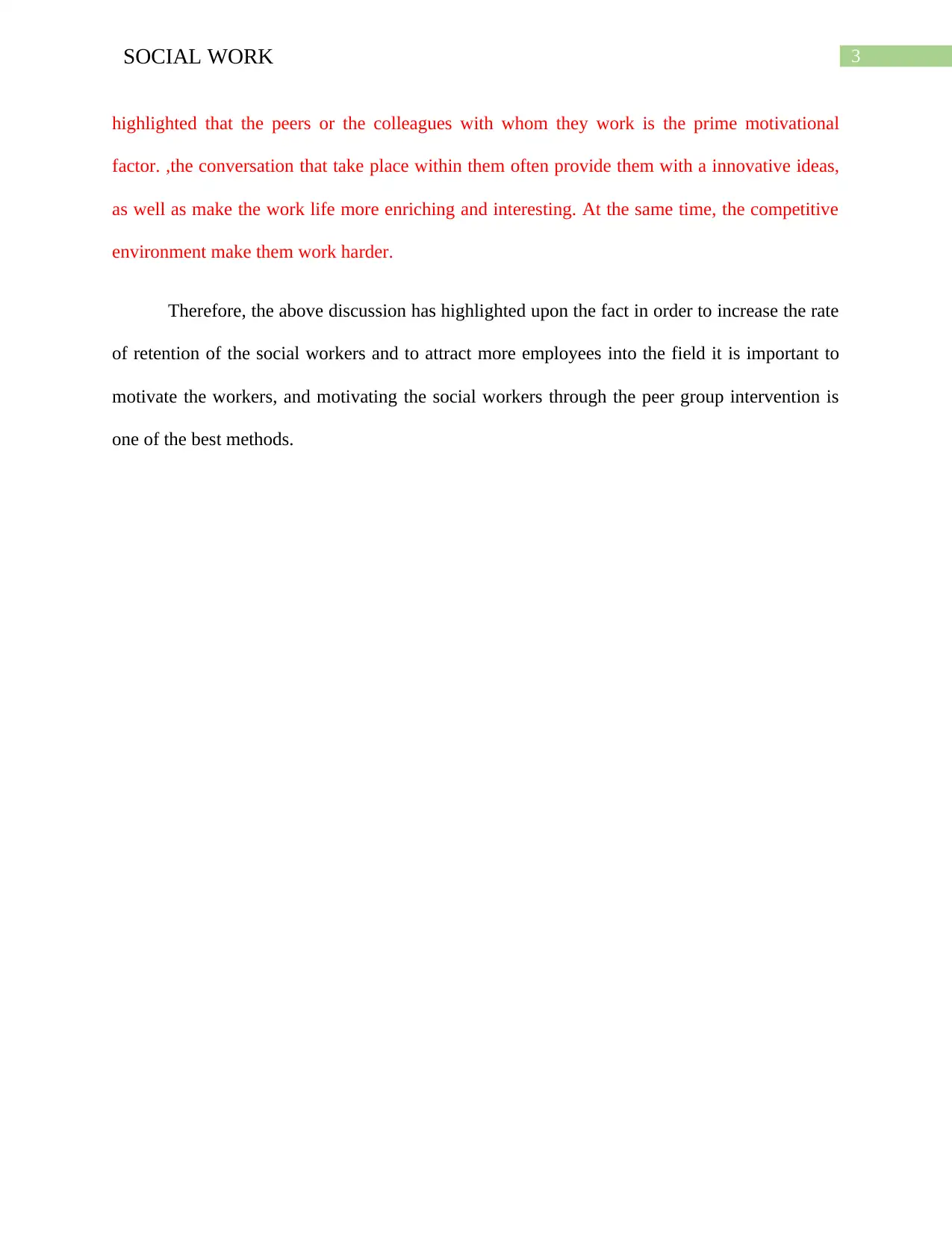
3SOCIAL WORK
highlighted that the peers or the colleagues with whom they work is the prime motivational
factor. ,the conversation that take place within them often provide them with a innovative ideas,
as well as make the work life more enriching and interesting. At the same time, the competitive
environment make them work harder.
Therefore, the above discussion has highlighted upon the fact in order to increase the rate
of retention of the social workers and to attract more employees into the field it is important to
motivate the workers, and motivating the social workers through the peer group intervention is
one of the best methods.
highlighted that the peers or the colleagues with whom they work is the prime motivational
factor. ,the conversation that take place within them often provide them with a innovative ideas,
as well as make the work life more enriching and interesting. At the same time, the competitive
environment make them work harder.
Therefore, the above discussion has highlighted upon the fact in order to increase the rate
of retention of the social workers and to attract more employees into the field it is important to
motivate the workers, and motivating the social workers through the peer group intervention is
one of the best methods.
Paraphrase This Document
Need a fresh take? Get an instant paraphrase of this document with our AI Paraphraser
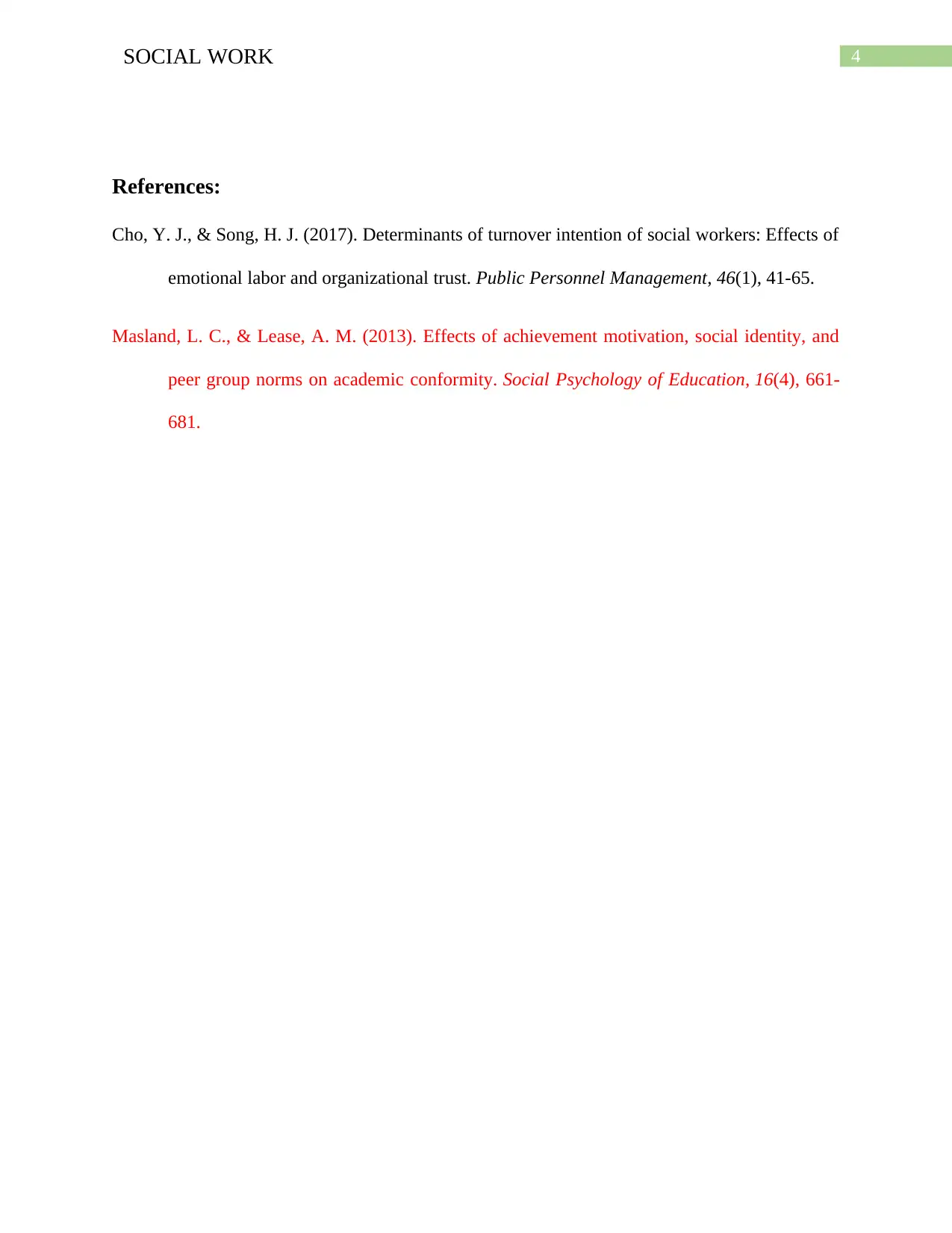
4SOCIAL WORK
References:
Cho, Y. J., & Song, H. J. (2017). Determinants of turnover intention of social workers: Effects of
emotional labor and organizational trust. Public Personnel Management, 46(1), 41-65.
Masland, L. C., & Lease, A. M. (2013). Effects of achievement motivation, social identity, and
peer group norms on academic conformity. Social Psychology of Education, 16(4), 661-
681.
References:
Cho, Y. J., & Song, H. J. (2017). Determinants of turnover intention of social workers: Effects of
emotional labor and organizational trust. Public Personnel Management, 46(1), 41-65.
Masland, L. C., & Lease, A. M. (2013). Effects of achievement motivation, social identity, and
peer group norms on academic conformity. Social Psychology of Education, 16(4), 661-
681.
1 out of 5
Related Documents
Your All-in-One AI-Powered Toolkit for Academic Success.
+13062052269
info@desklib.com
Available 24*7 on WhatsApp / Email
![[object Object]](/_next/static/media/star-bottom.7253800d.svg)
Unlock your academic potential
Copyright © 2020–2026 A2Z Services. All Rights Reserved. Developed and managed by ZUCOL.



